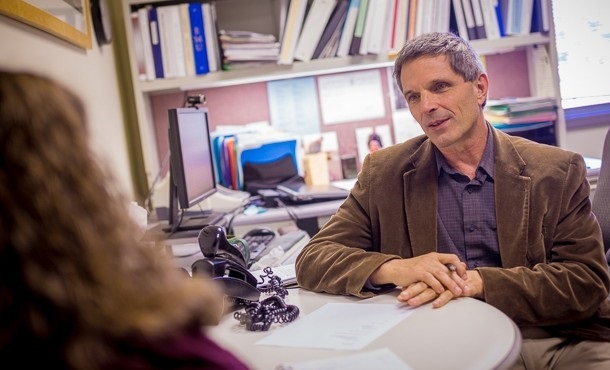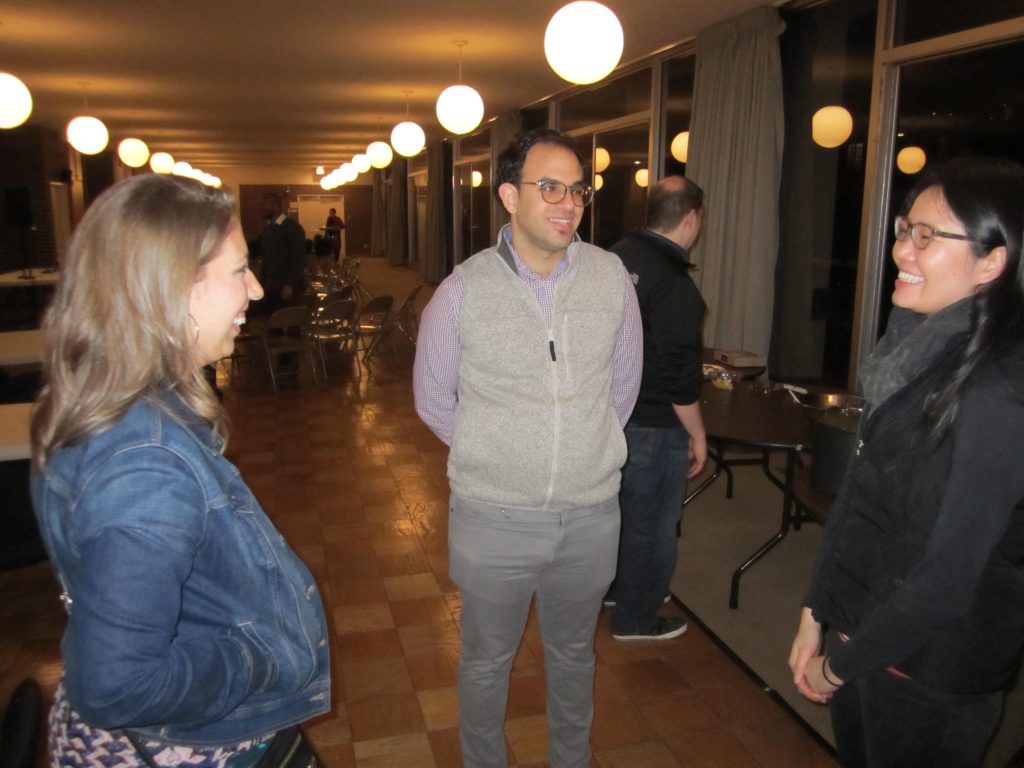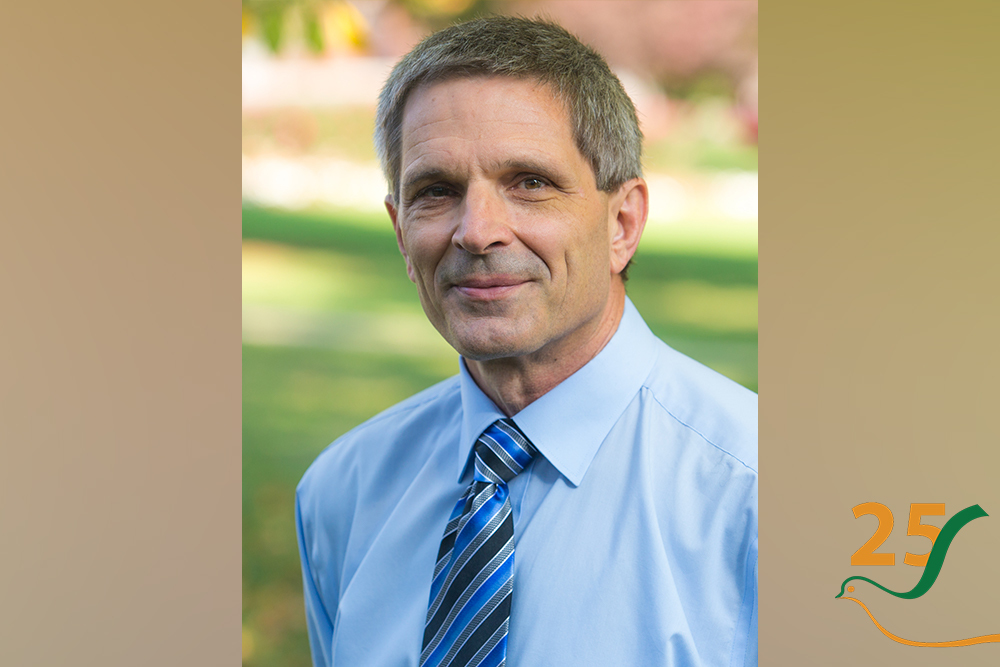During the 2019-20 academic year, as the Center for Justice and Peacebuilding commemorates its 25th anniversary, a series of guest authors will share reflections about CJP’s personal impact. We want to hear your thoughts, too!
Thousands of people have intersected with CJP over the years, and each of you has contributed to the work of making the world more just and more peaceful world. The 2020 event has been postponed to 2021. Visit the anniversary website for more details.
Read reflections by Phoebe Kilby, Muhammad Abu-Nimer, Maryam Sheikh, Howard Zehr and Ruth Zimmerman, Sanjay Pulipaka, Shyamika Jayasundara- Smits and Amy Potter Czajkowski
J. Daryl Byler, executive director from 2013-19, is our final guest contributor. He submitted his text in mid-February, long before the Covid-19 pandemic reached current proportions, and then a few days ago, added a preface, below, in bold.

When CJP alumni gathered for dinner in Washington DC in early February, none of us could have imagined how different our lives would be only six weeks later. Like a Category 5 hurricane, COVID-19 has torn through community after community around the world, leaving disruption and death in its path. Susan L. Taylor, writer and former editor-in-chief of Essence magazine writes that, “In every crisis there is a message. Crises are nature’s way of forcing change – breaking down old structures, shaking loose negative habits so that something new and better can take their place.” Even as we grieve the losses that this crisis has unleashed, may we pay attention to the new opportunities it creates for all who long for justice and peace.
***
As a child, I bought gifts for my parents at Martin Store on Mt. Clinton Pike — small boxes of chocolate-covered cherries for my dad and frilly handkerchiefs and lemon drops for my mother.
What Martin Store was known for at the time was a line of clothing that distinguished Mennonites from their worldly neighbors.
The store sold head coverings for Mennonite women and was stocked with bolts of fabric and thin-paper patterns that they used to make modest cape dresses. And Mennonite men could bring their fashionable JCPenney suit jackets to the store and have them altered into “plain” coats.
These clothing choices were marks of Mennonite identity, signifying separation from the world.
During my years as CJP’s executive director (2013-19), my office was in the renovated Martin Store. My desk was where the store’s show windows had been when I was a boy. I loved that this building had now been transformed into a space that symbolized Mennonite engagement with the world. A new identify that prized justice and peacebuilding.
Across the past 25 years, hundreds of students from around the world have trekked through Martin Store to pick up their mail, visit with CJP faculty and staff, attend a meeting in the conference room or take a course in the upstairs classroom.
At CJP, students find community, acquire conflict analysis tools, and hone peacebuilding skills. Indeed, what drew me to CJP was seeing firsthand the impact the program had on peacebuilders we sent to short-term SPI classes during our years as Mennonite Central Committee representatives in the Middle East.
These young adults were awestruck by their experience at CJP. They found a learning community where everyone was a teacher and everyone a learner. They delighted in the out-of-classroom opportunities to interact with peacebuilders from dozens of other countries. They returned to Palestine, Israel, Jordan, Iraq and Iran with new ideas and renewed energy to work for peace. In Amman, Jordan where we lived, we often gathered the Jordanian SPI-alumni together to talk about their peacebuilding work and to reminisce about their days at CJP.

Highlights of my six years at CJP included the addition of an MA in Restorative Justice, the expansion of CJP’s scholarship capacity, peacebuilding trainings in Iraq for youth and academics, and hosting a large delegation of Brazilians for an intensive restorative justice training week. Without a doubt, the thing I enjoyed most was interaction with CJP students — especially hosting monthly potluck meals in our home.
That is a tradition Cindy and I hope to continue in Washington DC where I now work at the DC Bar Foundation – an organization that seeks to make access to justice possible for city residents facing eviction from their homes, domestic abuse, deportation, discrimination and other life-altering legal challenges.
Dozens of CJP alumni now live and work in the Washington metro area. We recently hosted a gathering of nearly 20 alumni at our DC home. The group represented a microcosm of what CJP grads are doing around the world – working with NGOs and in government agencies, teaching in academic settings, and incorporating peacebuilding practices into a variety of work settings.

CJP alumni have done newsworthy things like creating peacebuilding institutes patterned after SPI, mediating large-scale conflicts, writing peacebuilding curricula, opening museums, and even winning the Nobel Peace Prize!
But at our recent CJP alumni gathering, I was reminded that some of the most significant peacebuilding work happens at home, as CJP alumni learn how to share power and practice peacebuilding in relationships with their life partners and children.
Indeed, practicing peacebuilding at home is always the hardest place. In my time at CJP, I often wished that, as faculty and staff, we would have done a better job of modeling what we taught in the classroom.
Just like Martin Store, we are all on a journey of transformation.
For 25 years now, CJP faculty and staff have planted seeds. Around the world, a vibrant crop of peacebuilders – thousands strong – is bearing fruit amidst some of the world’s most protracted and complex conflicts.
This crop of peacebuilders is not only the fruit of CJP’s past, it contains the seeds of CJP’s future – as graduates become CJP professors, as alumni voices from around the world are brought into classroom conversations, and as CJP’s curriculum integrates the learnings from CJP’s global practitioners.
My hopes for CJP’s future are that it will be financially accessible for all who want to study there, that it can maintain a healthy mix of U.S. and international students, that faculty and staff will increasingly reflect the diversity of the student body, and that alumni will continue to find and support each other in places like Washington, DC and Amman, Jordan.
First published 4/15/2020.

What a wonderful story!